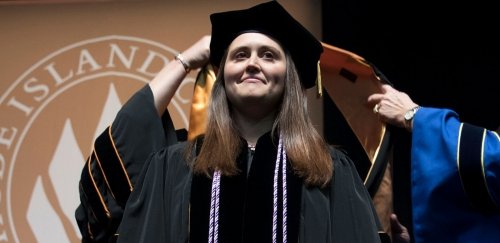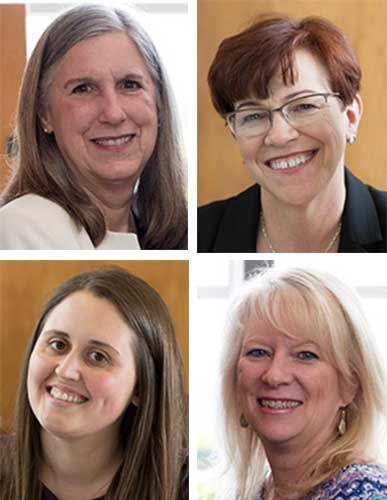RIC Invests in Nursing’s Future – First DNP Graduates
- News & Events
- News
- RIC Invests in Nursing’s Future – First DNP Graduates

Ashlee Viveiros (above) is one of four Rhode Island College graduates who earned the Doctor of Nursing Practice degree at the 2019 commencement ceremony. Here she is being hooded.
On May 11 Wendy Doremus, Jean Salera-Vieira, Ashlee Viveiros and Joan Walsh became the first graduates of Rhode Island College’s Doctor of Nursing Practice (DNP) program.

Bottom row, from left, Ashlee Viveiros and Joan Walsh
Administered by the School of Nursing and housed at the Rhode Island Nursing Education Center in downtown Providence, the DNP program consists of a full-time or part-time course of study. Graduates leave as highly trained leaders in the field of health care.
Along with their coursework, Doremus, Salera-Vieira, Viveiros and Walsh engaged in individual projects specifically designed to improve nursing practice and health outcomes. They presented their work before faculty, administrators and their peers on May 7.
All of their work was predicated on research-based evidence, which they translated and applied to clinical practice or to health-care systems as a whole.
Doremus focused her project on inequities in the quality of school nursing services, which, she said, are most prevalent in low-income communities. To eliminate these disparities, Doremus designed and tested an instrument that will allow states to identify gaps in state-level supports for school nursing services.
Doremus earned a B.A. in American studies at Franklin and Marshall College in 1979, an M.S. at Pace University in 1982 and her DNP at RIC in 2019. She has been an adjunct instructor in Rhode Island College’s School of Nursing for more than five years and is also coordinator for the RI Collaborative for Interprofessional Education and Practice.
Salera-Vieira, who earned her B.S.N. at RIC in 1997, her M.S.N. at URI in 2006, her Perinatal CNS graduate certificate at the University of Washington in 2014 and her DNP at RIC in 2019, works as a perinatal clinical nurse specialist at Newport Hospital. Salera-Vieira focused her project on the lack of postnatal supports for “intended parents” after they leave the birthing hospital. Intended parents, she explained, are people who become parents through a pregnancy carried by a gestational carrier or surrogate.
Through a survey of nurses and an extensive review of perinatal literature, Salera-Vieira discovered that, although there is a great deal of evidence-based research and literature on the importance of support for biological and adoptive parents in their transition to parenthood, there is a gap in the literature on what intended parents could benefit from during their transition to parenthood and the services available to support them.
She intends to disseminate her findings to local and national perinatal leaders to raise awareness and is also conducting a study with a colleague to understand the lived postnatal experience of intended parents.
A three-time RIC grad (B.S.N. ’11, M.S.N. ’16, DNP ’19), Viveiros’ research project focused on the overuse of central venous access devices in hospitals. These are a type of IV line placed in a large vessel in the body for the purposes of administering specific medications and fluids and for critical care monitoring.
Overuse of these devices places patients at unnecessary risk of infection, which can cause harm or death, Viveiros said. Her project involved implementing an existing evidence-based guideline that will equip nurses with the knowledge they need to make appropriate recommendations for device use.
Also a three-time RIC grad (B.S.N. ’83, M.S.N. ’11, DNP ’19), Walsh was honored with the 2019 Alumni Honor Roll Award for outstanding achievement in her field. She is adjunct professor in the M.S.N. program at RIC and neuroscience nursing quality and safety manager at Rhode Island Hospital.
Walsh focused her project on improving the way food is administered to neurocritical care patients who cannot eat normally and who must receive liquid tube feedings via the stomach. According to Walsh, tube feedings are frequently interrupted for various reasons, such as tests that need to be done on the patient or daily care of the patient, which results in inadequate nutrition for the patient.
Walsh implemented a protocol for use after an interruption in feeding that allows nurses to increase the delivery rate of the tube feeding to catch up on the missed tube feeding.
“With the old method, patients were only receiving an average of 72 percent of their nutrition,” Walsh said. “The new method allows them to receive an average of 95 percent of their nutrition – a significant improvement.”
In reflecting on the DNP program, all four graduates were effusive in their praise of the program.
“RIC’s DNP program has taken my nursing practice to another level,” Walsh said. “I’ve achieved advanced skills in the areas of leadership, research, epidemiology, informatics, interprofessional collaboration and team leadership. I also gained a great appreciation for the strength of interprofessional teams, which cannot be achieved by any one individual or discipline.”
Walsh’s peers agreed on all counts.
“Through the DNP program, I now feel capable of conducting meaningful research that can have a direct impact on improving nursing practice and population health outcomes,” Doremus said, while Salera-Vieira is already incorporating learnings from the DNP program into her practice as a perinatal clinical nurse specialist and nurse leader. “It’s wonderful to have the opportunity to make an impact on the health of the populations we serve,” she said.
“It has also been wonderful to complete my terminal degree at the same school that gave me such a strong foundation as a nurse,” said Viveiros.
Director of the DNP Program, Marie Wilks, congratulated the inaugural graduates. “These students have succeeded in a rigorous program while completing significant projects that will change nursing practice now and in the future,” she said.
